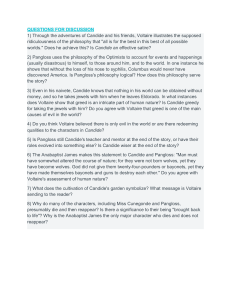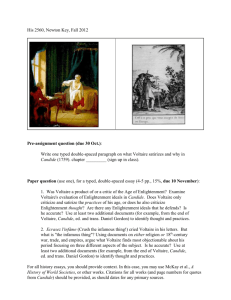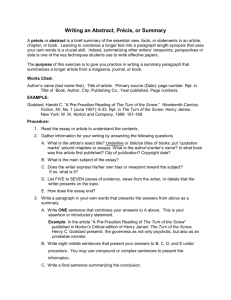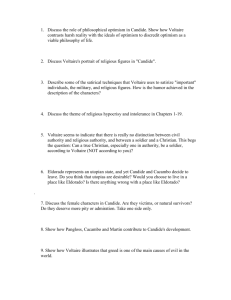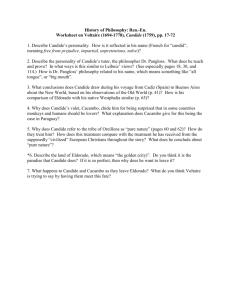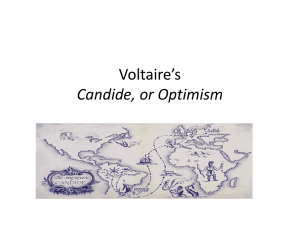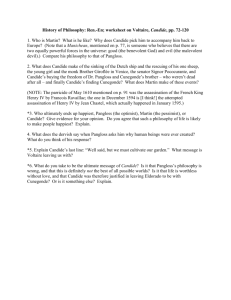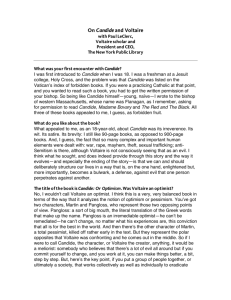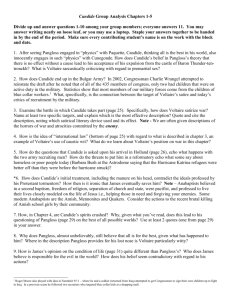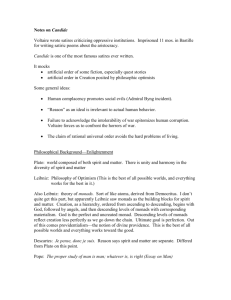Candide: Overview
advertisement
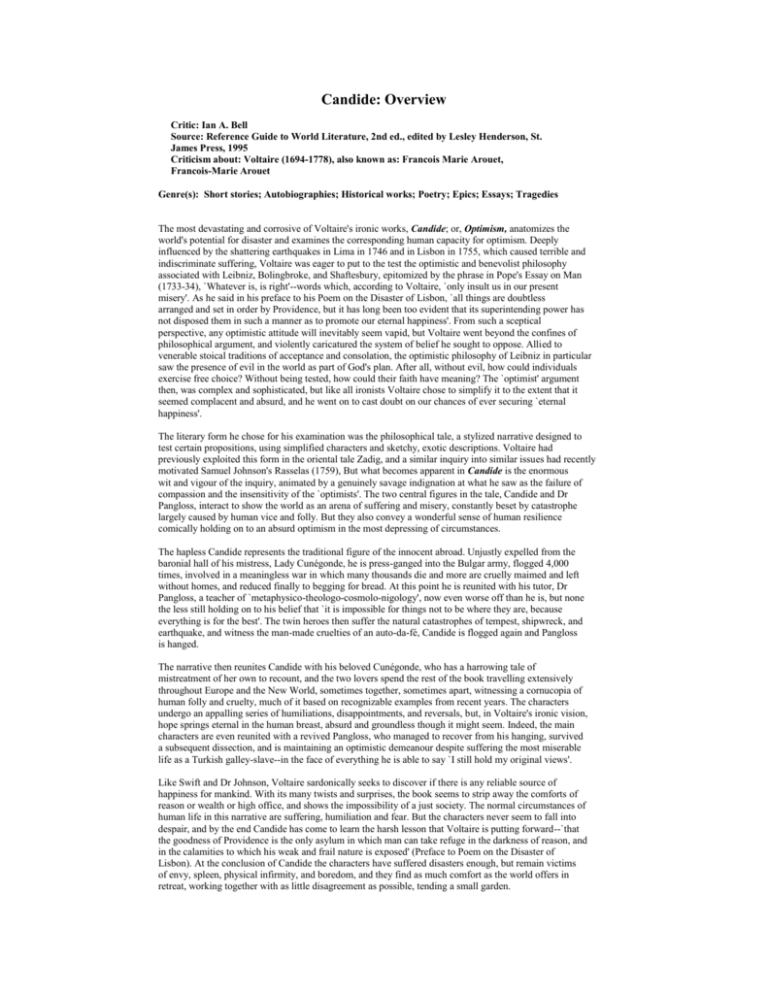
Candide: Overview Critic: Ian A. Bell Source: Reference Guide to World Literature, 2nd ed., edited by Lesley Henderson, St. James Press, 1995 Criticism about: Voltaire (1694-1778), also known as: Francois Marie Arouet, Francois-Marie Arouet Genre(s): Short stories; Autobiographies; Historical works; Poetry; Epics; Essays; Tragedies The most devastating and corrosive of Voltaire's ironic works, Candide; or, Optimism, anatomizes the world's potential for disaster and examines the corresponding human capacity for optimism. Deeply influenced by the shattering earthquakes in Lima in 1746 and in Lisbon in 1755, which caused terrible and indiscriminate suffering, Voltaire was eager to put to the test the optimistic and benevolist philosophy associated with Leibniz, Bolingbroke, and Shaftesbury, epitomized by the phrase in Pope's Essay on Man (1733-34), `Whatever is, is right'--words which, according to Voltaire, `only insult us in our present misery'. As he said in his preface to his Poem on the Disaster of Lisbon, `all things are doubtless arranged and set in order by Providence, but it has long been too evident that its superintending power has not disposed them in such a manner as to promote our eternal happiness'. From such a sceptical perspective, any optimistic attitude will inevitably seem vapid, but Voltaire went beyond the confines of philosophical argument, and violently caricatured the system of belief he sought to oppose. Allied to venerable stoical traditions of acceptance and consolation, the optimistic philosophy of Leibniz in particular saw the presence of evil in the world as part of God's plan. After all, without evil, how could individuals exercise free choice? Without being tested, how could their faith have meaning? The `optimist' argument then, was complex and sophisticated, but like all ironists Voltaire chose to simplify it to the extent that it seemed complacent and absurd, and he went on to cast doubt on our chances of ever securing `eternal happiness'. The literary form he chose for his examination was the philosophical tale, a stylized narrative designed to test certain propositions, using simplified characters and sketchy, exotic descriptions. Voltaire had previously exploited this form in the oriental tale Zadig, and a similar inquiry into similar issues had recently motivated Samuel Johnson's Rasselas (1759), But what becomes apparent in Candide is the enormous wit and vigour of the inquiry, animated by a genuinely savage indignation at what he saw as the failure of compassion and the insensitivity of the `optimists'. The two central figures in the tale, Candide and Dr Pangloss, interact to show the world as an arena of suffering and misery, constantly beset by catastrophe largely caused by human vice and folly. But they also convey a wonderful sense of human resilience comically holding on to an absurd optimism in the most depressing of circumstances. The hapless Candide represents the traditional figure of the innocent abroad. Unjustly expelled from the baronial hall of his mistress, Lady Cunégonde, he is press-ganged into the Bulgar army, flogged 4,000 times, involved in a meaningless war in which many thousands die and more are cruelly maimed and left without homes, and reduced finally to begging for bread. At this point he is reunited with his tutor, Dr Pangloss, a teacher of `metaphysico-theologo-cosmolo-nigology', now even worse off than he is, but none the less still holding on to his belief that `it is impossible for things not to be where they are, because everything is for the best'. The twin heroes then suffer the natural catastrophes of tempest, shipwreck, and earthquake, and witness the man-made cruelties of an auto-da-fé, Candide is flogged again and Pangloss is hanged. The narrative then reunites Candide with his beloved Cunégonde, who has a harrowing tale of mistreatment of her own to recount, and the two lovers spend the rest of the book travelling extensively throughout Europe and the New World, sometimes together, sometimes apart, witnessing a cornucopia of human folly and cruelty, much of it based on recognizable examples from recent years. The characters undergo an appalling series of humiliations, disappointments, and reversals, but, in Voltaire's ironic vision, hope springs eternal in the human breast, absurd and groundless though it might seem. Indeed, the main characters are even reunited with a revived Pangloss, who managed to recover from his hanging, survived a subsequent dissection, and is maintaining an optimistic demeanour despite suffering the most miserable life as a Turkish galley-slave--in the face of everything he is able to say `I still hold my original views'. Like Swift and Dr Johnson, Voltaire sardonically seeks to discover if there is any reliable source of happiness for mankind. With its many twists and surprises, the book seems to strip away the comforts of reason or wealth or high office, and shows the impossibility of a just society. The normal circumstances of human life in this narrative are suffering, humiliation and fear. But the characters never seem to fall into despair, and by the end Candide has come to learn the harsh lesson that Voltaire is putting forward--`that the goodness of Providence is the only asylum in which man can take refuge in the darkness of reason, and in the calamities to which his weak and frail nature is exposed' (Preface to Poem on the Disaster of Lisbon). At the conclusion of Candide the characters have suffered disasters enough, but remain victims of envy, spleen, physical infirmity, and boredom, and they find as much comfort as the world offers in retreat, working together with as little disagreement as possible, tending a small garden. Candide is thus one of the most playful and at the same time most serious of works, in which the ironies of human life are unveiled, intensified by the constant reminders of recent history, and in which a deeply equivocal resignation is reached. It is deliberately disorientating to read, switching its ironic perspectives around, but its eventual effect is of a gleeful carnival rather than a sombre procession. Source: Ian A. Bell, "Candide: Overview" in Reference Guide to World Literature, 2nd ed., edited by Lesley Henderson, St. James Press, 1995. Source Database: Literature Resource Center
